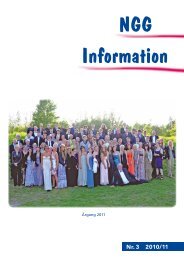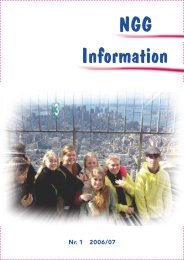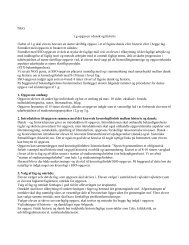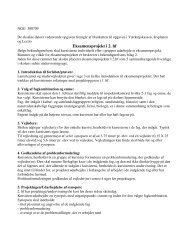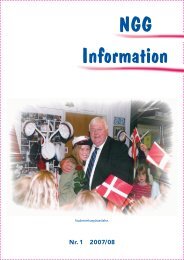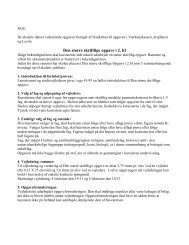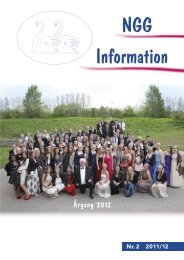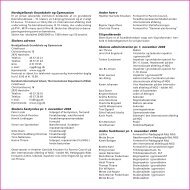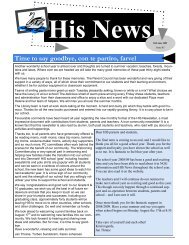NGG-Information #2 2008-2009 - Nordsjællands Grundskole og ...
NGG-Information #2 2008-2009 - Nordsjællands Grundskole og ...
NGG-Information #2 2008-2009 - Nordsjællands Grundskole og ...
Create successful ePaper yourself
Turn your PDF publications into a flip-book with our unique Google optimized e-Paper software.
odol<strong>og</strong>y and to develop new skills and ideas<br />
for their teaching which ultimately benefit our<br />
students.<br />
Comments from the teachers who attended<br />
workshops include:<br />
Derek Scott MYP Humanities<br />
I attended the Humanities workshop where we<br />
focussed on both subject planning issues and<br />
on team planning activities (including working<br />
with Archana to create a plan for a Science-<br />
Humanities interdisciplinary unit for year 4).<br />
At one point in the Humanities workshops I was<br />
able to share photocopied examples of completed<br />
student work from my classes here at<br />
HIS, in response to a particular task about the<br />
planning of assessment, and I was touched by<br />
the positive response they were met by, and<br />
ended up sharing some of these exemplars<br />
both on paper and by email (as far afield as<br />
Azerbaijan!) with my colleagues in the Humanities<br />
group. (I have received 27 resources by<br />
email, that I may be able to use in the future, in<br />
return!) The point that I valued most about the<br />
whole three-day workshop was that we stayed<br />
consistently on the subject of planning and<br />
remained completely focused on it. All other<br />
issues pop up naturally, if you have planning as<br />
your overarching aim.<br />
Jan Alling MYP Technol<strong>og</strong>y<br />
I was on a course in a combination of computer<br />
and Design Technol<strong>og</strong>y, which is changing to<br />
22<br />
Technol<strong>og</strong>y from next year. The reason for this<br />
is that they want to let the student learn to work<br />
with design. The learning process is from MYP<br />
Year 1 to MYPYear 4 after which the students<br />
should be able to produce a real life product in<br />
MYP Year 5 that could, in some way, be marketed<br />
outside the school.<br />
Examples could be:<br />
a) Make a travel guide.<br />
b) Make a toy to improve children’s<br />
motor skills.<br />
c) Look at different kinds of l<strong>og</strong>istics.<br />
A very informative and worthwhile course.<br />
Archana Painuly MYP Science<br />
We were twenty-eight teachers from around<br />
twenty-two different countries. Rubin Borges<br />
was our workshop leader. All t<strong>og</strong>ether we had<br />
twelve sessions. The workshop was very informative<br />
and useful. During the sessions we<br />
had interesting discussions on the existing<br />
practices in the participants’ schools and how<br />
IB MYP methodol<strong>og</strong>y and curriculum planning<br />
should be implemented in our teaching. We<br />
exchanged ideas and our views on assessment<br />
tasks. The workshop was quite useful and it<br />
provided clarity on various items related to MYP<br />
teaching including interim objectives, strands,<br />
collaborative planning, unit planners, designing<br />
criterion-related tasks, assessment in the MYP<br />
etc. I feel this will be helpful in my teaching to<br />
MYP students in the school.<br />
Forårskoncert Gymnasiets skolekomedie<br />
Gymnasiefest



